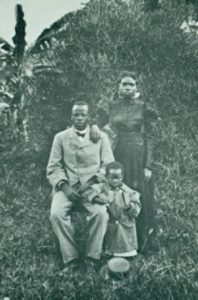
John Chilembwe
*John Chilembwe's birth is celebrated on this date in 1871. He was a Black African minister, activist, and educator.
John Chilembwe was born in Sangano, Chiradzulu District, in the south of what became Nyasaland. His pre-baptismal name was Nkologo. Chilembwe's father was a Yao, and his mother, a Mang'anja slave, captured in warfare. Chilembwe's granddaughter stated that Chilembwe's father might have been called Kaundama and was one of those who settled at Mangoche Hill during the Yao infiltration into Mang'anja territory. His mother may have been called Nyangu. However, other quite recent sources also give differing parental names. Chilembwe attended a Church of Scotland mission in 1890.
In 1892, he became a house servant of Joseph Booth, a radical and independent-minded missionary. Booth arrived in Africa 1892 as a Baptist to establish the Zambezi Industrial Mission. He was critical of the reluctance of Scottish Presbyterian missions to admit Black Africans as full church members. He later founded seven more independent missions in Nyasaland, which focused on the equality of all worshippers. In 1897, Booth and Chilembwe traveled together to the United States. Booth introduced Chilembwe to the Reverend Lewis G Gordon, Foreign Missions Secretary of the National Baptist Convention, who arranged for Chilembwe to attend the Virginia Theological Seminary and College (now the Virginia University of Lynchburg).
The principal was an activist and independent black, Gregory Hayes. He and Chilembwe both experienced the contemporary prejudice against blacks. They were exposed to radical American Negro ideas and the works of John Brown, Booker T. Washington, Frederick Douglass, and others. He was ordained as a Baptist minister at Lynchburg in 1899. After completing his studies at Lynchburg in 1900, he returned to Nyasaland in 1900 with the blessing of the Foreign Missions Board and financial assistance from the National Baptist Convention. Although Chilembwe had been reasonably successful in his first decade as a minister, five years before his death, he faced many problems in the mission and his personal life.
For the first 12 years of his ministry after his return to Nyasaland, Chilembwe encouraged Black African self-respect and advancement through education, hard work, and personal responsibility. White Protestant missionaries initially supported his activities, although his relations with Catholic missions were less friendly. One of the earliest campaigns, a German invasion of Nyasaland and a battle at Karonga in September 1914, caused Chilembwe to write an impassioned letter against the war to the "Nyasaland Times" newspaper. He wrote that a number of his countrymen "have already shed their blood"; others were being "crippled for life" and "invited to die for a cause which is not theirs." The wartime censor prevented the publication of the letter, and by December 1914, Chilembwe was regarded with suspicion by the white colonial authorities.
The aims of the revolt remain unclear, partly because Chilembwe and many of his leading supporters were killed and also because many documents were destroyed in a fire in 1919. However, the theme of "Africa for the Africans" suggests a political motive rather than a purely millennial religious one. Chilembwe is said to have drawn parallels between his rising and Brown's and stated his wish to "strike a blow and die" immediately before the rising started.
John Chilembwe died during the Chilembwe revolt on February 3, 1915. Nyasal gained independence in 1964, taking the name Malawi. Chilembwe's likeness was seen on the obverse of all Malawian Kwacha notes from 1997 until May 2012, when new notes were launched; the 500 Kwacha note still carries his portrait. Since December 2016, the newly introduced 2000 Kwacha note also carries his picture. John Chilembwe Day is observed annually on January 15th in Malawi.